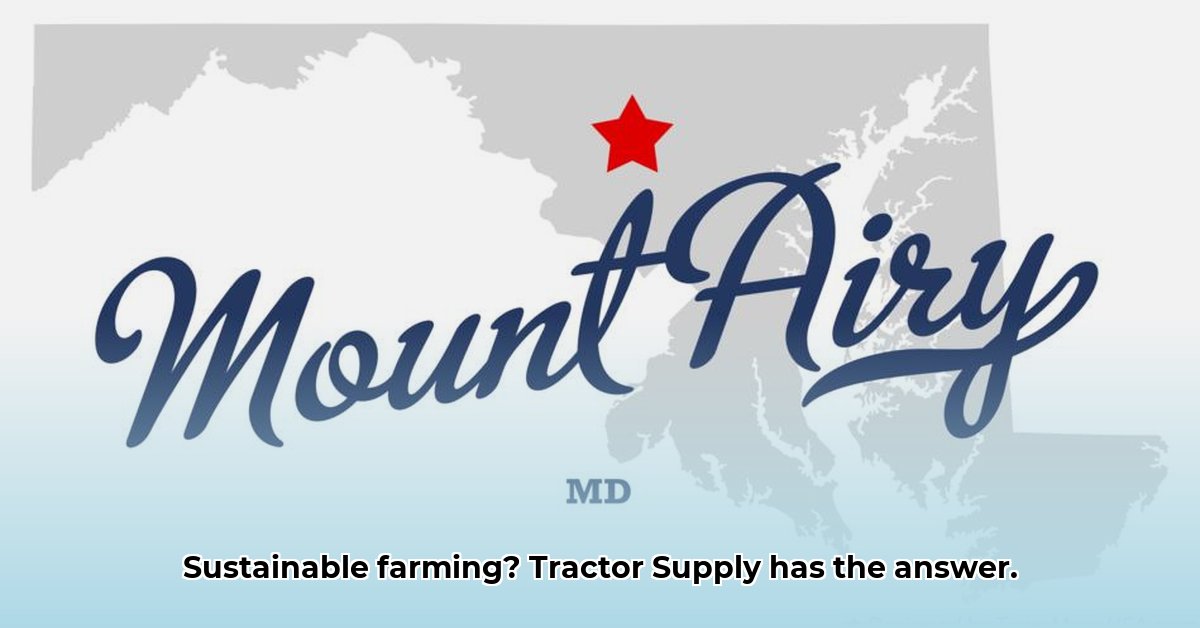
Tractor Supply Company (TSC) in Mount Airy, Maryland, serves as a vital resource for local farmers and gardeners. This article analyzes TSC's contribution to sustainable agriculture in the area, examining both its positive impacts and areas needing improvement. We explore the accessibility and product diversity alongside concerns regarding transparency and environmental impacts. For more information on this specific location, visit the Mount Airy TSC page.
A Closer Look at TSC's Local Impact
TSC's Mount Airy location provides a wide range of agricultural products, offering convenience to farmers of all sizes. This accessibility is crucial for efficient farm management and timely responses to changing agricultural needs. However, does this convenience translate to sustainable agricultural practices? That's the central question guiding this analysis.
The Benefits: Accessibility and Product Variety
TSC's extensive inventory is a significant advantage. From animal feed crucial for responsible livestock management to tools for diverse farming needs (organic vegetable gardening to large-scale operations), the store caters to a broad spectrum of agricultural activities. This readily available resource allows for efficient resource management, minimizing waste and travel time. But does the convenience truly equate to environmental sustainability?
Challenges: Transparency and Environmental Concerns
A major limitation is the lack of readily available information on the sustainability certifications of TSC products. Without clear data on the environmental impact of its products (fertilizers, pesticides, feed), a complete assessment of TSC's contribution to sustainable agriculture remains elusive. The sale of products like propane, while useful, raises environmental concerns. The absence of detailed information on sales volumes and associated emissions hinders a transparent evaluation of its overall carbon footprint. Does the convenience offered come at an environmental cost?
Comparing TSC to Competitors and Best Practices
A comprehensive assessment requires comparing TSC's practices with those of competitors and industry best practices. How does TSC's commitment to sustainability compare to other agricultural suppliers with explicit sustainability initiatives? What lessons can be learned from companies prioritizing eco-friendly sourcing and supply chain transparency? A comparative analysis is critical to identify areas for improvement. What actions can TSC undertake to align its practices more closely with industry leaders in sustainable agriculture?
Actionable Steps Towards a Greener Future: Recommendations
To enhance the sustainability of agricultural practices in the Mount Airy area, several key steps are necessary:
Tractor Supply Company: Conduct a thorough life cycle assessment (LCA) of major product lines and publicly release sustainability goals and progress reports. This increased transparency will build trust and allow for more informed purchasing decisions by farmers and consumers. (Expected Outcome: Increased public trust, improved supply chain sustainability, data-driven decision-making).
Maryland Farmers: Actively engage in sustainable agricultural policies and practices, including seeking out collaboration opportunities with TSC and local government agencies to foster community-based sustainability initiatives. (Expected Outcome: Stronger community-based sustainability initiatives, improved environmental stewardship).
Consumers: Support businesses demonstrating a strong commitment to sustainability. Ask questions about product sourcing, environmental impact, and manufacturing processes. This consumer demand will influence businesses to adopt more sustainable practices. (Expected Outcome: Consumer pressure driving companies towards greener practices, informed purchasing decisions).
Government Agencies: Partner with TSC and Maryland farmers to implement sustainability programs. Invest in research and development of sustainable agricultural technologies, coupled with educational initiatives about sustainable farming. (Expected Outcome: Accelerated development and adoption of sustainable agricultural technologies and best practices).
Conclusion: The Path to Sustainable Agriculture
TSC's role in the Mount Airy community is significant. Its accessibility and product diversity undeniably benefit local farmers. However, improvement in transparency and a stronger commitment to sustainability are crucial. By addressing these areas, TSC can effectively contribute to a greener agricultural future. The journey towards sustainable practices needs continuous collaboration between businesses, farmers, consumers, and government agencies. The potential for positive change is significant, and TSC is well-positioned to play a leading role. Continued monitoring and evaluation are needed to track progress and ensure lasting impact.